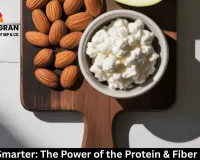Helpful for Weight Loss: Easy Ways to Include Papaya in Your Diet
Digital Desk

Are you struggling with weight gain despite regular exercise? If so, including papaya in your diet can make your weight loss journey easier. Papaya is not only delicious but also highly beneficial for health. It is rich in fiber, vitamin C, vitamin A, potassium, and other essential minerals, making it an excellent source of nutrition.
Papaya is not a magic weight-loss fruit, but it can support weight loss goals because it is low in calories and high in fiber, which promotes fullness. News articles highlight its benefits for digestion due to the enzyme papain, its high water content that reduces bloating, and its role in aiding metabolism.
How to Eat Papaya Correctly
The timing and method of eating papaya matter for weight loss. Experts recommend consuming papaya about two hours before meals, as it keeps the stomach full for longer and helps control appetite. You can also pair papaya with milk or yogurt to add protein and calcium to your diet.
Papaya Helps Burn Fat
Papaya acts as a natural fat burner. Its high fiber content boosts metabolism and helps burn stored body fat. By keeping you full for longer, it reduces the likelihood of overeating, making the weight loss process easier and more effective.
Other Health Benefits of Papaya
Papaya is not just useful for weight loss—it also supports gut health and helps reduce digestive issues. Regular consumption strengthens the immune system and enhances the body’s natural resistance to diseases. Additionally, antioxidants and nutrients in papaya benefit skin and hair health.
Like other fruits, papaya is healthy when consumed as part of a balanced diet and is relatively low in calories, according to the USDA's MyPlate guidelines. The nutritional components in papaya include:
- 2.7g fiber or 10% DV (Daily Value).
- 31 milligrams (mg) calcium or 3.1% DV.
- 33 mg magnesium or 8% DV.
- 286 mg potassium or 6.08% DV.
- 0.13 mg zinc or 0.9% DV.
- 95.6 mg vitamin C or 106.2% DV.
- 58 micrograms (mcg) folate or 14.5% DV.
- 1.492 International Units (IU) vitamin A or 30% DV.
- 0.47 mg vitamin E or 2.4% DV.
- 4.1 mcg vitamin K or 5.1% DV.
- 68 calories.





.jpg)
.jpg)
.jpg)
.jpg)
.jpg)

